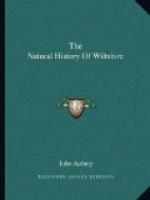Quaere, if it would not bee the better way to send our wooll beyond the sea again, as in the time of the staple? For the Dutch and French doe spinn finer, work cheaper, and die better. Our cloathiers combine against the wooll-masters, and keep their spinners but just alive: they steale hedges, spoile coppices, and are trained up as nurseries of sedition and rebellion.
[For a long series of years the clothiers, or manufacturers, and the wool-growers, or landowners, entertained opposite opinions respecting the propriety of exporting wool; and numerous acts of parliament were passed at different times encouraging or restricting its exportation, as either of these conflicting interests happened to prevail for the time with the legislature. The landowners were generally desirous to export their produce, without restriction, to foreign markets, and to limit the importation of competing wool from abroad. The manufacturers, on the contrary, wished for the free importation of those foreign wools, without an admixture of which the native produce cannot be successfully manufactured; whilst they were anxious to restrain the exportation of British wool, from an absurd fear of injury to their own trade. Some curious particulars of the contest between these parties, and of the history of legislation on the subject, will be found in Porter’s Progress of the Nation and McCulloch’s Commercial Dictionary and Statistical Account of the British Empire; and more particularly in Bischoff’s History of Wool (1842). The wool trade is now free from either import or export duties. - J. B.]
PART II. — CHAPTER X.
Fallingof rents.
[Aubrey addressed to his friend Mr. Francis Lodwyck, merchant of London, a project on the wool trade; proposing, amongst other things, a duty on the importation of Spanish wool, with a view to raise the price of English wool, and consequently the rent of land. (See the Note on this subject in the preceding page.) Mr. Lodwyck’s letter in reply, fully discussing the question, may be consulted in Aubrey’s manuscript by any one interested in the subject It is inserted in the chapter now under consideration; which contains also a printed pamphlet with the following title:- “A Treatise on Wool, and the Manufacture of it; in a letter to a friend: occasioned upon a discourse concerning the great abatements and low value of lands. Wherein it is shewed how their worth and value may be advanced by the improvement of the manufacture and price of our English wooll. Together with the Presentment of the Grand Jury of the County of Somerset at the General Quarter Sessions begun at Brewton the 13th day of January 1684. London. Printed for William Crooke, at the Green Dragon without Temple Bar. 1685.” (Sm. 4to. pp. 32.) — J. B.]
The falling of rents is a consequence of the decay of the Turky-trade; which is the principall cause of the falling of the price of wooll. Another reason that conduces to the falling of the prices of wooll is our women’s wearing so much silk and Indian ware as they doe. By these meanes my farme at Chalke is worse by sixty pounds per annum than it was before the civill warres.




